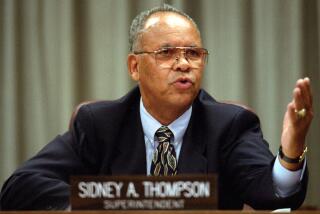EDUCATION’S AL SHANKER
- Share via
Elaine Woo’s profile of American Federation of Teachers President Albert Shanker (“Blow Up the Schools!” Dec. 1) was revealing beyond its depiction of a true mover and shaker of our time.
I admired Shanker long before I became a teacher; when I began teaching, his words helped give me perspective on my job. But it has been distressing to read his writing during the last two years. His emphasis on discipline, standards and tracking represents retrenchment and offers a distorted comparison of American systems with those of Japan, England, Germany, etc. Schools develop within a culture. Imposing hierarchical models that Shanker says seem to “work” seems antithetical to the innovations of his early career.
Why did Shanker’s approach change? Is his concept of the union threatened by something beyond the criticism constantly leveled at teachers and schools--perhaps a general trend away from unionization? Or is school-based management, referred to so dismissively in the article, actually beginning to effect change and shift power to local communities. Woo’s article has caused me to rethink the often-arduous process of change my school is undergoing and view it in a more favorable light.
Lynne Stephens Culp
University High School
West Los Angeles
*
To imply that Shanker takes on issues for the sake of popularity or to be near the center of power is wrong. We who have worked closely with the man know that he says what he believes in, regardless of who agrees with him. And although many of us active in teacher unionism have at times been opposed to his conclusions, more often we’ve agreed with his provocative, insightful and visionary opinions.
Shanker’s call for increased standards of discipline and achievement are right on the money. Poll after poll show clearly--across all ethnic and economic lines--that parents want schools that are safe, schools that demand high student achievement. That’s why the UTLA this year is instituting a “Lessons for Life” campaign, a program designed to raise standards of achievement and discipline in the Los Angeles Unified School District. And the idea came from Shanker, a force for the positive improvement of education in the United States for decades.
Day Higuchi, President
United Teachers Los Angeles
*
The Shanker article proves Ralph Waldo Emerson’s maxim: “To be great is to be misunderstood.”
Steven D. Klein
Los Angeles
*
Countless international studies of educational achievement have ranked American students from mediocre to poor in every tested subject. Yet we continue to eschew even the most obvious of solutions.
Woo quotes Shanker as suggesting two fundamental changes: removing the chronically disruptive from regular classrooms, and establishing different but demanding requirements, depending on whether a student is bound for college, trade school or work. For those suggestions, Shanker is variously branded a reactionary conservative, an opportunist and a racist. What is conservative, racist or opportunistic about demanding classroom discipline and measurable achievement at international levels? On such issues there should be no ideological argument.
I have taught in American secondary schools for 20 years, and I know that Shanker is right. We need to remove the “chronically disruptive” from regular classrooms, and we need national standards that would facilitate the establishment of “different but demanding” requirements.
Shanker’s entire career reflects a consistent bent toward dealing with the facts and rejecting the bizarre myths that we have created. He deserves a large and attentive audience.
Is anyone listening?
Jim Mamer
Modjeska Canyon
*
Not all children like abstract thought. Some are hands-on people who just want to be taught skills, get a job and start their lives. In Europe, such children at 14 are tracked so they can contribute their best skills to society. Here we burden our junior colleges by asking them to teach skills that former generations learned in high school.
I propose a 16-year-old’s choice. Students who like abstract thought would get two years of college prep. The hands-on type would get two years of technical training to prepare them for the job market. Lazy young people would be coached to get their GED diploma and would not burden the taxpayers any further.
Millie Bonazzoli
Santa Clarita






